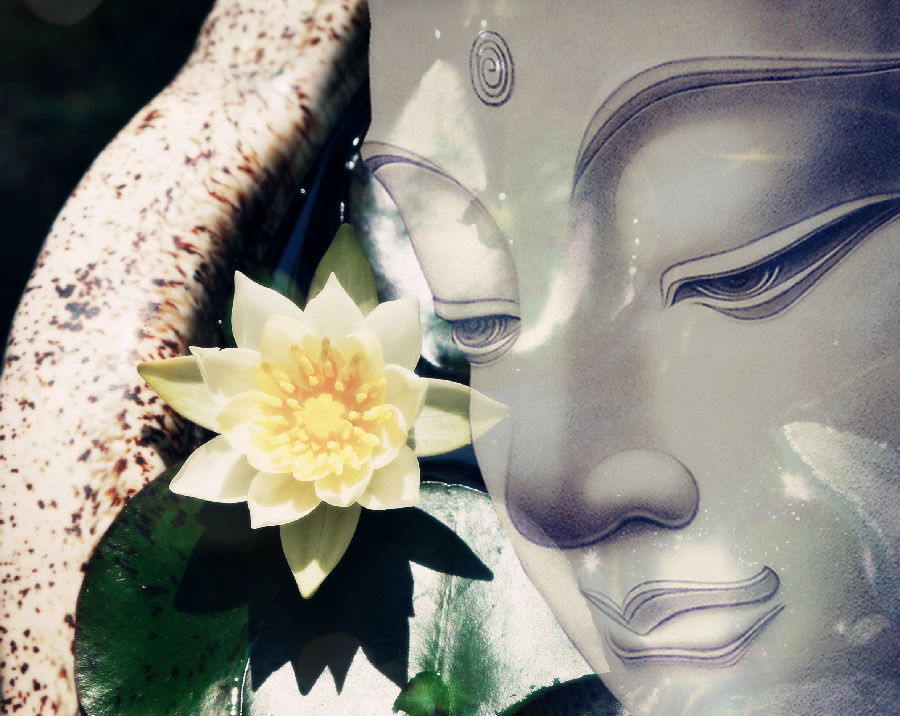Like so much in Buddhism, Nirvana clearly has to be experienced, not explained.
就像佛教中的许多概念,很明显涅槃是要修行,而非口头上的解释。
But for Buddhists, the journey to get there, the path you take, seems to be as important as the arriving.
但对佛教徒而言,这条通往涅槃之路和到达目的地同等重要。
Buddhists will tell you that Nirvana has no fixed point in time or space.
佛教徒会告诉你,涅槃并非特定的时间或空间。
And that's actually a little ironic, because one of the few accepted fixtures of the Buddhist story is where the Buddha himself found enlightenment.
这有点讽刺,因为在少数被广泛接受而又非常确定的佛教故事中,其中一个就是佛陀开悟的地点。

We're told that that took place in Northern India under the spreading branches of a peepul tree.
我们知道那是在印度北部一棵枝繁叶茂的菩提树树荫下。
Which is where my quest had started, at Bodhgaya, at this spot where it's said Buddhist philosophy really began 2,500 years ago.
就是我这次旅程的起点,菩提伽耶。那里就是2500多年前佛教的发源地。
In this journey I have explored key facets of Buddhist belief and got a little closer to understanding something vital about the core of Buddhist philosophy, the Dharma.
在这趟旅程中,我探究了佛教信仰的主要方面,并近距离了解佛教哲学核心概念“法”的重要意义。
The Dharma is simply the way the world is.
法就是世界存在的方式。
And we can all best live our lives if we follow a path that allows us to deal with the world as passionately, as compassionately, as positively and as wisely as possible.
如果遵循这条路,尽可能胸怀慈悲,并积极明智地生活,所有人都会得到最好的人生。
Now, whatever the permutations and interpretations of Buddhism, that seems to me to be pretty simple and pretty enlightened.
现在,无论别人如何解释佛教,在我看来却是相当简单明了。
I've learnt about Karma, how mindful actions impact on our lives, about Samsara,
我了解到因果报应,铭记行为会如何影响自己的生活。
the cycle of life, birth and death, about meditation, about Zen, and the final goal for all Buddhists, Nirvana.
了解到轮回,生命的循环,生生死死。了解到冥想和禅,以及所有佛教徒的终极目标——涅槃。
I have seen some of the most beautiful architecture inspired by Buddhist ideas.
我看到了受到佛教思想启发的优美建筑。
And how, after 25 centuries, Buddhism still attracts millions across the globe.
看到了在25个世纪之后佛教依然吸引着全球数以百万计的信众。
A philosophy that is rooted in its ancient past and yet gives character to the modern world.
看到了这门根植于古老过去的哲学,仍将其特质赋予现代社会。
How Buddhism places the responsibility to realise the truth on all of us.
看到了佛教是如何让我们所有人担荷起发现真理的重任。
As Buddhism travelled, it transformed the cultures it came into contact with, just as it too was transformed.
佛教在传播途中,改变了与之接触的文明同时,自身也发生了变化。
You wonder if Buddha could ever possibly have imagined the impact that his ideas would have on human history.
不知佛陀是否曾经想过他的思想对人类历史所产生的影响。
Particularly given the one thing he was certain about, was that impermanence and change were the only things that were definite in this world.
特别是他非常确定的那件事,无常变化,是这个世界唯一不变的东西。
Just listen to this - it's one of his most poetic epithets.
来听听这段偈颂吧——非常有诗意。
So shall you think of all this fleeting world.
所以你认为所有这些短暂的世界。
A star at dawn, a bubble in a stream.
一切有为法,如梦幻泡影。
A flash of lightning in a summer cloud.
如露亦如电,应作如是观。
A flickering lamp, a phantom, and a dream.
一个闪烁的灯,一个幽灵,一个梦想。
Well, the Buddha's dreams of 2,500 years ago are still with us.
佛陀在2500年前的梦想依然与我们同在。
And they've been made incarnate in one of the most tenacious belief systems of all time and in some of the most iconic and beautiful monuments in the world.
它化身为历史上最为顽强的信仰体系之一,和一些世界上最具标志性的优美建筑。












